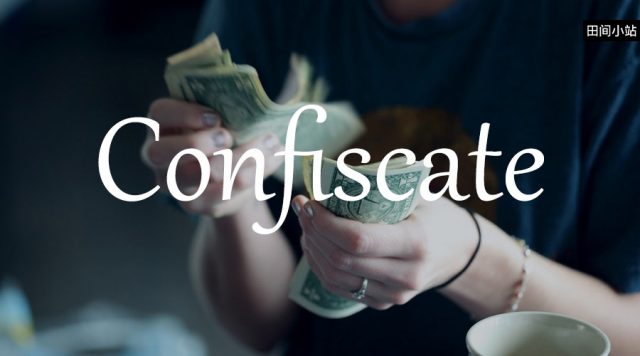
TEM4 TEM8 GRE
外刊例句
- The emperor and his officials sometimes confiscated inventions and prevented their spread.
皇帝和官员们有时会将发明创造没收充公,严禁传播普及。
——《经济学人》 - There was no hint that the older man who called a couple of years back about selling a picture could be sitting on an unimaginable trove of art confiscated or banned by the Nazis.
几年前那个老人打电话来说有一幅画要卖时,没人能想象他手中掌握着的是一个难以置信的宝藏,全是被纳粹没收或查封的艺术品。
——《纽约时报》
基本释义
[verb] to officially take sth away from sb, especially as a punishment
[动词] (尤指作为惩罚)没收,把…充公
深入解读
Confiscate 源自拉丁语 confiscatus ,由con (和,一起) + fiscus (国库,详见:小词详解 | fiscal )构成,主要表示“通过行使权力来没收或者充公某人的物品或财产”,大到犯罪分子的违法所得(confiscate illegal gains),小到上课时偷看的连环画。
Confiscate 与上一期熟词僻义讲到的 appropriate 虽然不同但又有相通之处。通的是都需要行使权力,不同的是前者意在没收或充公,而后者意在占为己用。有时候这两者也会同时发生,比如在美国禁酒令实施期间,一些治安官在查抄和没收(confiscate)私酒后,会在未经授权许可的情况下将其占为己有用于自饮(appropriate)。
名人用例
Lenin is said to have declared that the best way to destroy the capitalist system was to debauch the currency. By a continuing process of inflation, governments can confiscate, secretly and unobserved, an important part of the wealth of their citizens.
列宁宣称,摧毁资本主义最好的方法是摧毁其通货。通过一个持续的通货膨胀过程,政府可以秘密而隐蔽地把国民的大部分财富收为国有。
出自英国经济学家约翰·梅纳德·凯恩斯(John Maynard Keynes, 1883年6月5日-1946年4月21日)。一反自18世纪亚当·斯密以来尊重市场机制、反对人为干预的经济学思想,凯恩斯主张政府应积极扮演经济舵手的角色,透过财政与货币政策来对抗经济衰退乃至于经济萧条。
同近义词
- impound: (of the police, courts of law, etc.) to take sth away from sb, so that they cannot use it
- forfeit: lose or be deprived of (property or a right or privilege) as a penalty for wrongdoing
- expropriate: (formal or law) (of a government or an authority) to officially take away private property from its owner for public use
